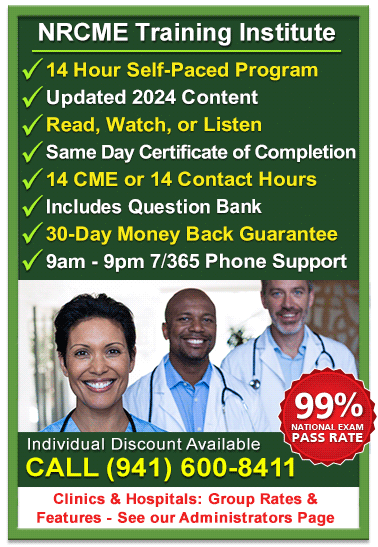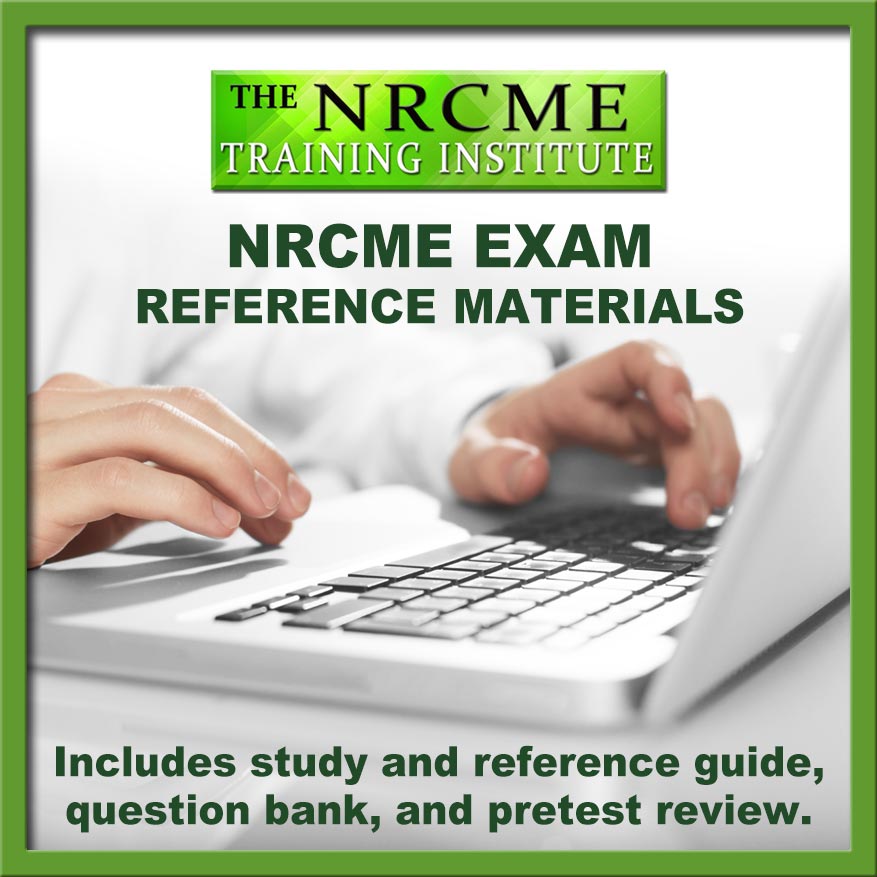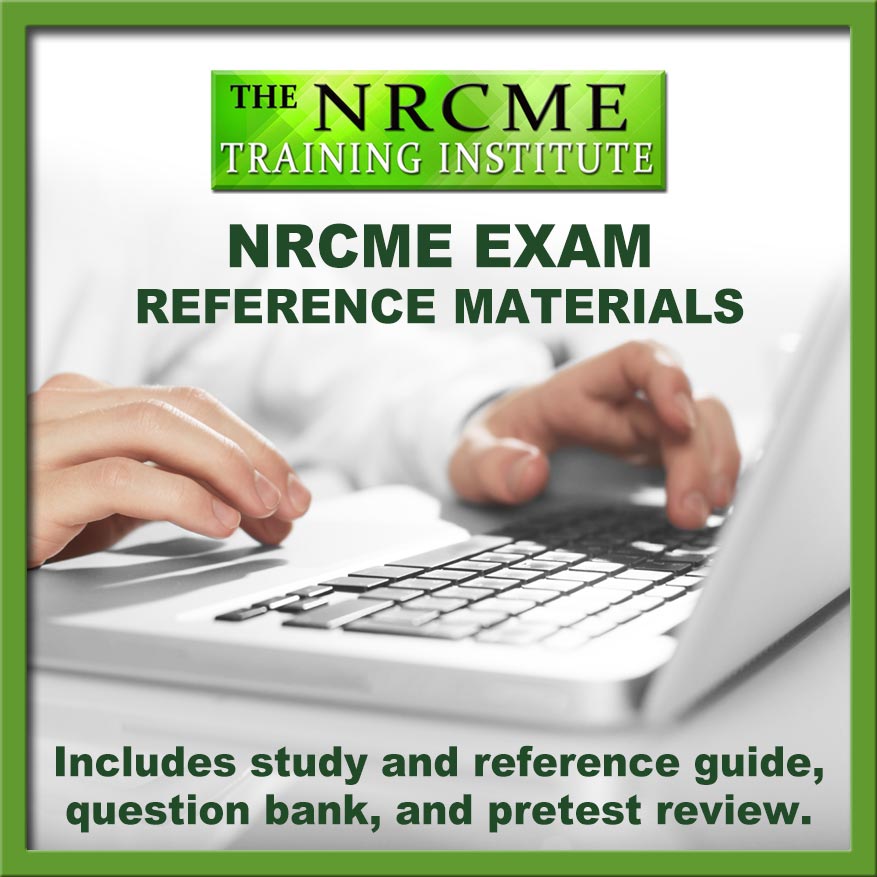
Exam Prep Questions
NRCME Exam Prep Questions
The following questions and answers are proprietary to our NRCME training program. They are crafted to provide you with the best possible preparation and insight into the NRCME exam. Unauthorized use or distribution is strictly prohibited.
b. Proceed with the examination.
c. Perform functional testing.
d. Refer the driver to orthopedics.
b – The Medical Examiner’s responsibility with respect to SPE Certificates is to examine the driver, document the presence of abnormal findings, assess whether the driver has a condition that requires a SPE Certificate in order to be cleared to drive, and, if so, document on the Medical Examiner’s Certificate that the driver is qualified if “Accompanied by a Skill Performance Evaluation (SPE) Certificate.” The driver is responsible to make the application, or re-application, to the FMCSA for the SPE Certificate, which is approved and issued by the FMCSA, not the Medical Examiner. The process of applying for a SPE certificate requires that the driver is examined by an orthopedist or physiatrist, but there is no requirement that the Medical Examiner make that referral. A Medical Examiner may perform some type of functional testing or refer a driver for some type of functional testing but that should only be done after the Medical Examiner has examined the driver.
Practice Question 2:
The driver does not indicate any medical conditions on health history. During the exam the Medical Examiner notes the presence of a hearing aid in one ear. The driver says that he doesn’t need the hearing aid to drive and doesn’t think it should be required. The next step for the Medical Examiner is:
a. Test the driver’s hearing without the hearing aid.
b. Examine the driver’s ears.
c. Refer the driver for hearing assessment by a specialist with specialized audiometric testing capabilities for testing drivers while wearing a hearing aid.
d. Certify the driver with the qualification “wearing hearing aid”.
a – The usual process for the driver examination is testing hearing, vision, and urinalysis, then performing the physical examination, so of the answers testing the driver’s hearing is the next step. If the driver passes a whisper or audiometric test without a hearing aid, no further testing of hearing is needed. If the driver fails the hearing test(s) without a hearing aid, then testing the driver’s hearing with a whisper test is the next step. If the driver fails a whisper test with a hearing aid, the driver will need to have audiometric testing by a specialist using specialized audiometric testing equipment.
Practice Question 3:
The driver describes alcohol use including 2 drinks a night during the week and a 6 pack on the weekends. The Medical Examiner’s next step should be to:
a. Refer the driver for evaluation by a substance abuse professional.
b. Further assess the driver’s history of and current use of alcohol.
c. Disqualify the driver.
d. Test the driver for drugs and alcohol.
b – The Medical Examiner should assess the driver’s history of alcohol (and other drug use) in detail, bearing in mind that denial is common in all types of substance abuse. Next steps after that assessment could include requesting medical records from the driver’s treating providers and/or referral for assessment by a substance abuse professional or other qualified provider. Disqualification should be considered if the Medical Examiner suspects that the driver may be impaired due to current substance abuse. Drug and alcohol testing is not required as part of a driver medical examination but may be performed by the Medical Examiner.
Practice Question 4:
Which conditions are disqualifying by regulation?
b. Seizures/epilepsy and insulin-dependent diabetes.
c. Insulin-dependent diabetes and monocular vision.
d. Hearing loss and insulin-dependent diabetes.
a – Current (as of 2024) disqualifying conditions by regulation are hearing loss and seizures/epilepsy. Insulin-dependent diabetes was disqualifying by regulation until 2018 and monocular vision was disqualifying by regulation until 2022, but both of those conditions are now subject to alternative qualification standards.
Practice Question 5:
Who is responsible to maintain a copy of the Medical Examination form MCSA-5875?
a. The driver.
b. The employer.
c. The Medical Examiner.
d. The medical office where the examination was performed.
c – The FMCSA requires that the Medical Examiner maintain a copy of MCSA-5875. This could be problematic if the Medical Examiner moves from 1 practice to another, retires, or otherwise may have difficulties meeting this requirement. The FMCSA will hold the Medical Examiner responsible, for example, if the FMCSA requires that a copy of the form be made available within 48 hours as part of an investigation or audit.
Practice Question 6:
Which of the following is not required by 49 CFR Part 391.46 which describes requirements for the evaluation of a driver with Insulin-Treated Diabetes Mellitus (ITDM)?
a. Evaluation by the treating clinician (TC), the provider responsible for managing the driver's diabetes and prescribing insulin.
b. A requirement for drivers to carry a rapidly absorbable form of glucose.
c. Completion by the treating clinician (TC) of form MCSA-5870, the Insulin-Treated Diabetes Mellitus Assessment Form.
d. Examination by the Medical Examiner no more than 45 days after completion of form MCSA-5870, the Insulin-Treated Diabetes Mellitus Assessment Form.
b – Although recommended, drivers are not required to carry a rapidly absorbable form of glucose.
For additional NRCME exam references, including over 400 proprietary practice questions, purchase our $99 NRCME Exam Reference Materials
NRCME Exam Reference Materials
Share

Recent Blogs
View all-

Drug Testing CDL Applicants
MEs play a crucial role in the CDL qualification process, but drug testing is not part of the DOT physical exam.
Drug Testing CDL Applicants
MEs play a crucial role in the CDL qualification process, but drug testing is not part of the DOT physical exam.
-

2024 SPE Technical Amendment
The update addresses precision prehension and power grasp prehension capabilities and addresses ME documentation errors.
2024 SPE Technical Amendment
The update addresses precision prehension and power grasp prehension capabilities and addresses ME documentation errors.
-

A Question Bank to Master the NRCME Exam
Our question bank isn’t just a practice tool—it’s a confidence builder.
A Question Bank to Master the NRCME Exam
Our question bank isn’t just a practice tool—it’s a confidence builder.
Participant Testimonials
"I have reviewed every other training program available, and the NRCME Training Institute program stood out for simplicity, clarity, and price."
"Elegant, thorough, easy-to-use!"
"This has to be the best dotmedical examiner course for the money and customer service. I'm very pleased."
"All of my providers were happy with the program and telephone support. The go at your own pace learning system was good for both inexperienced and experienced providers. Even the most experienced commented that they learned new information that will be invaluable."
"Presented the fundamentals clearly and offered as much additional detail as my providers wanted."
"The NRCME Training Institute program was fantastic! I was able to quickly gain the knowledge I needed and pass the certification examination."
"Best DOT training program for the money."
Copyright
© 2024. This CME-certified activity is held as copyrighted © by The NRCME Training Institute. Through this notice, The NRCME Training Institute grants permission of its use for educational purposes only. These materials may not be used, in whole or in part, for any commercial purposes without prior permission in writing from the copyright owner(s).




